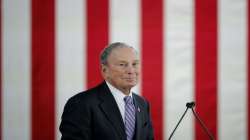Democrat presidential race turns ideology battle as Bloomberg quits
Michael Bloomberg dropped out of the Democratic Party's race for the presidential nomination turning it into a clear ideological battle pitching the centrist wing of the party coalescing around former Vice President Joe Biden against Senator Bernie Sanders's radical left. Biden stunningly re-emerged the leading candidate after winning nine of the 14 intra-party elections.

Michael Bloomberg dropped out of the Democratic Party's race for the presidential nomination on Wednesday, turning it into a clear ideological battle pitching the centrist wing of the party coalescing around former Vice President Joe Biden against Senator Bernie Sanders's radical left. Biden stunningly re-emerged the leading candidate after winning nine of the 14 intra-party elections on Tuesday, having lagged behind Sanders and even others in the first three polls.
Multi-billionaire Bloomberg, who had spent about $400 mn of his own money to campaign in the polls to select the Democratic nominee to take on President Donald Trump in the November election, was the fourth candidate to drop out and the third to endorse Biden.
Announcing his decision, Bloomberg said, "I entered the race for president to defeat Donald Trump. Today, I am leaving the race for the same reason: to defeat Donald Trump."
"Staying in would make achieving that goal more difficult" apparently because an extended party battle would sap the moderates' energy, he said.
After the country's experience with billionaire Trump, there was skepticism within the Democratic Party to have another run for President, especially one who had been a Republican, and the others in the race had emphasized this as well as his record of racist and sexist statements.
Now the formidable money power Bloomberg, who owns the news and financial information service bearing his name and is a former Mayor of New York City, will be available to take on both self-declared socialist Sanders and Trump.
Ideology has taken center-stage in the Democratic Party with the question of who can defeat Trump and many feared that a socialist would not only lose to Trump but also being down others running for Congress through association with him.
Expressing the views of the party establishment - with which many moderates agree - Biden had said that the country did not need a revolution.
Sanders has attacked Biden for his support for the Iraq war and his support for cuts to Social Security, the federal plan for seniors.
There are still two other candidates in the race, both of them leftists whose platforms are close to that of Sanders.
Senator Elizabeth Warren, who lost in her home state Massachusetts, was reported to be consulting her staff and allies about whether to continue in the race.
Hindu American member of the House of Representatives Tulsi Gabbard has polled only about one percent or less of the votes in various states. She supported Sanders in 2016.
Small-town Mayor Pete Buttigieg, who initially had a strong showing, and Senator Amy Klobuchar dropped out of the party primaries after Biden re-emerged as a strong candidate getting more than half the votes in the party poll in South Carolina and backed him in the "Super Tuesday" primaries in 14 states.
Another billionaire, Tom Steyer, has also dropped out, but not formally endorsed Biden.
Sanders, who had been leading in the opinion polls in some of the 14, ended up with only four states.
Sanders appeals to younger voters with his radical ideas for free college tuition, government-run healthcare for all, cutbacks to the military spending and a national minimum wage of $15 per hour.
After languishing in three of the first three polls, Biden proved his electoral viability in South Carolina.
Biden has emerged the leader with 27.5 percent support to 26 percent for Sanders in the latest national opinion polls of Democrats aggregated by RealClear Politics, a reversal from last week when Sanders was ahead by six percent.
The Democratic Party polls are select the 3,979 delegates committed to different candidates who will then elect the party's nominee at its national convention in July.
Polls have to be held in 32 more states going into June and 14 states that went to the polls on "Super Tuesday" were the biggest batch accounting for about a third of the delegates and give a clearer picture of the race.
Although Sanders lost in the large states Virginia and Texas, where he led in opinion polls, he won in California, the biggest state with the most delegates.
ALSO READ | US Elections 2020: Democratic Party faces embarrassment in Iowa caucus due to result delay
ALSO READ | 14 US states to vote in 'Super Tuesday' primaries